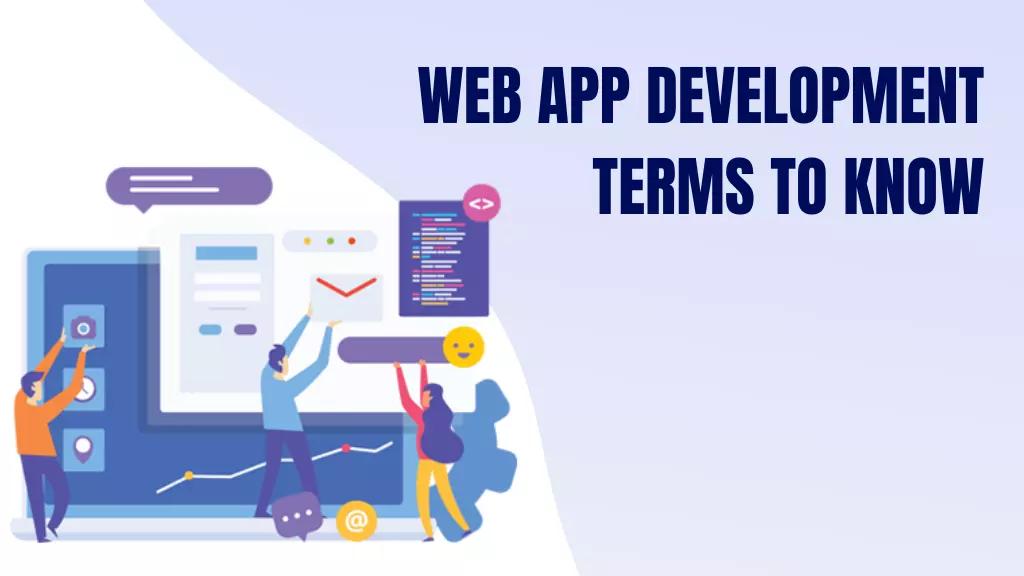The advent of software has simplified people's lives.
Innumerable apps and software are available online to ease day-to-day work, and innovation has made it even a lot easier to browse these apps.
How?
The answer is Web App Development.
With the continuous evolution in the IT industry web apps were developed for businesses and for their consumers to make it accessible and convenient for everyone.
Although everyone is familiar with web apps, if you are having any business ideas and thinking of switching your business to an online medium by developing an app, it is important to learn about the common terms you might come across during the process.
So before talking about how web apps have catered to the people and the common terms, you should first understand what web applications are.
So here we go…
What is Web App Development?
Web app development fulfills the need of both mobile applications and websites. The web apps are cloud-hosted and run on web servers and are accessible on any web browser with an active internet connection.
Read: Web Application Development Process
Additionally, these apps do not require any extra space on your device, giving you a seamless browsing experience.
Some top users of web apps include Gmail, Yahoo, Netflix, Wikipedia, Twitter, and many more.
Benefits of Web App Development
Developing web apps cater to innumerable benefits both for the business and its customers. The benefits of web app development are -
-
It makes a business accessible to consumers anytime and anywhere.
-
It is cost-effective since you can operate the same code on different platforms.
-
It does not consume any space on the user’s device.
-
Web apps are SEO-friendly which means that they can help you drive more potential leads.
-
The apps do not require frequent updates, as the updates are automatically implemented into the application without the need to update them manually like mobile apps.
-
It helps you track, record, and analyze customer behavior which you can use to provide custom offers and send notifications accordingly.
-
It also helps you build a great online presence in the market and helps in building the trust of your customers.
The aforementioned are a few of the benefits of developing a web app and there are many more that you will surely come across.
Before developing an application make sure that you conduct thorough research, develop a plan, and work accordingly.
Now that you have a clearer view of web app development and its benefits, you should also know some of the terms that are important and you might come across during the process.
.png)
Web App Development Terms to Know
The common terms you might come across during the web app development process are-
- Agile - This term is one of the most common buzzwords that you will come across during the development process. Agile or agile software development refers to a method or a practice involved in software development that requires a core set of values and can be achievable with adaptive planning and understanding the project requirements with an instant solution while cooperating with cross-functional teams, customers, and end-users.
- Algorithm - It is an important part of the problem-solving capability in computer programming and the IT industry. Algorithms are used to perform calculations and data processing, where the developers document all the important steps that are needed to solve the problem.
- API - API or Application Programming Interface is a set of functions or a process that helps in handling communication between two or more programs in an application or software using requests and responses.
- Adaptive Design - It refers to a graphical user interface (GUI), and is a way that promotes the creation of multiple layouts or versions of a web page to determine the appearance of different devices and different screen sizes.
- Backend - It is also known as server-side development, also referred to as the data access layer or the backbone of software. It powers the front end of software by connecting the backend code and exchanging data to develop full-fledged and functional software.
- Browser - It is an application that helps to access websites and display web pages. Microsoft Edge, Google Chrome, and Safari are the most common web browsers that are used by almost everyone. It helps in gathering information from the web by sending search requests and displaying the results on your device.
- Bug - This is the most common term for a software developer. In simple terms, a bug is an error or a mistake that you might find in the code of the software, which prevents an application from operating as it should or as planned.
- Cache - In simple terms, Cache is a temporary storage space for data, so that future requests for that data can be served faster enabling quicker loading of the webpage.
- Code - The most important part of any software or application is the code. It is a set of instructions or a system of rules that the developers write using different programming languages.
- CSS - CSS or Cascading style sheets, is a style sheet markup language that is used to describe the visual elements of a website. It tells the browser how the HTML elements should be displayed including layout, colors, and fonts. It improves content accessibility and provides flexibility in the specification of the characteristics.
- Debugging - The process of finding bugs and errors in the code and rectifying them is called debugging. This is an essential part of the software development process which helps the developers to ensure that the app is functioning properly as it was determined during the initial phase of the development.
- Deployment - Generally, it is the final step of the software development process, which comes after the testing of the application. It makes the developed software or application available for use by deploying it on predetermined platforms like the App Store, Play Store, or on the web.
- Documentation - It is another part of the software development process that takes place before the start of the development process, which involves information about the software like the features and functionalities that are to be integrated into the software along with the architecture, design, technology stack, programming languages, and the frameworks.
- Domain Name - It is a series of strings that helps in the identification of a website with authority on the internet. Generally, it is a user-friendly label for the IP address which identifies a website.
- Framework - It is also known as a software framework that helps in developing and deploying applications, products, and solutions. It may also include libraries, compilers, toolsets, and APIs, which come together to form an application. Node.js, Ruby on Rails, AngularJS, and many more are some of the famous frameworks that are used by top industry giants and development companies.
- Frontend - It is the GUI (Graphical User Interface) that helps the users to view and interact with an application. HTML, CSS, and JavaScript, are some of the common frontend languages that help in developing the visual output of a website.
- Git - It is an open-source, free, version-control software that helps developers to store and manage their code. Speed, data integrity, and support for distributed workflows are the primary goals of Git, and also enables developers to manage multiple projects at once and track the changes and reverse them when needed.
- GitHub- It is a cloud interface and the largest host of source code for Git with over 83 million users globally. It enables bug tracking, task management, and version control functionality for Git.
- HTML - Also known as Hyper Text Markup Language, is a standard markup language and is also among the building blocks of the web, that helps in displaying documents in a web browser.
- HTTP - It is an application layer protocol that is used to transfer data across the internet, and is also known as Hypertext Transfer Protocol.
- Java - It is an object-oriented, class-based, high-level, and widely used programming language developed by Sun Microsystems that helps in compilation to standard bytecode, and can run on any device.
- Libraries - These are stores of pre-written codes and modules that help the developers to take and insert them into the code they’re writing while developing software.
- Mobile-First - It is an approach to web design and development, where software is developed with the mobile-first approach considering how it might look on a mobile device.
- MVP - Also known as Minimum Viable Product, it is a version of an app that focuses on the core features and functions and is developed and released in the market for acquiring user feedback to make future improvements.
- Operating System - It is system software that helps a user to run applications on any device. Windows, Mac, Android, and Linux, are common examples of common operating systems.
- Plugin - It is an extension and a software component that helps in adding extra functionality to the software.
- Responsive Design - It is an approach that helps the software adapt to different screen sizes and orientations, regardless of the device being used to view a web page.
- Sitemap - It is an outline or a list of pages that contain information about the pages, videos, and other files of a website along with their relationship.
- SSL - Also known as Secure Sockets Layer, it is a standard security protocol that helps in establishing authenticated and encrypted links between the web server and the browser.
- Wireframe - It is a blueprint of an application, that helps the developers to determine how an app should be structured with the primary focus on functionality.
 Summing Up
Summing Up
We hope that the blog has helped you understand everything about software development and the process associated with it. Now that you are familiar with almost all the important terms of web app development, it would be a lot easier for you to hire developers for your project and understand what they are working on without them explaining.


